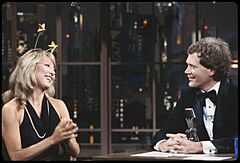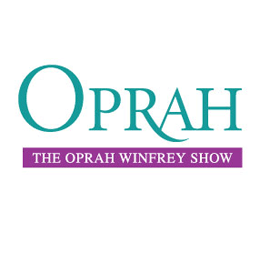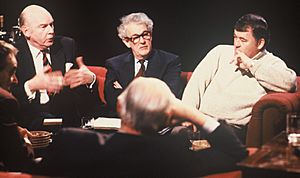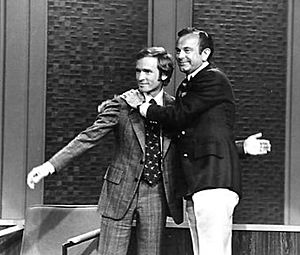Talk show facts for kids
A talk show is a type of television, radio, or podcast show that is all about conversation. In a talk show, a host talks with one or more guests about different subjects. This can be a formal interview or just a casual chat.
The topics can be anything from what's happening in the news to fun stories about movies and music. The host's personality is very important because it sets the show's mood. A key part of a talk show is that the conversation feels fresh and spontaneous, as if it's happening for the first time.
Talk shows have been around for a long time, starting in the 1950s. They come in many different styles, which are often shown at different times of the day.
Contents
What Makes a Talk Show?
Talk shows have a few things in common that make them different from other programs.
- Focus on the Audience: They are made for the viewers, who might even call in or be part of a studio audience.
- Different Viewpoints: Guests often have opposing opinions or different levels of knowledge. You might see an expert discussing a topic with someone who has personal experience with it.
- Personal Stories Matter: These shows often value life experience just as much as formal education.
- The Host is in Charge: The host guides the conversation, asks questions, and makes sure the show stays on track. The goal might be to inform, entertain, or discuss a conflict.
- Always Something New: Each episode usually focuses on a different topic or a new angle on an important issue.
- Low Production Cost: They are generally cheaper to make than big-budget dramas or movies.
- Live or Taped Live: Talk shows are often broadcast live or recorded in one go with very little editing. This helps them feel immediate and spontaneous.
Types of Talk Shows
There are several kinds of talk shows, and you can often tell what kind it is by when it's on TV.
- Early Morning Shows: These mix news updates, interviews with famous people, and music. They are also called breakfast television.
- Daytime Talk Shows: These often have a panel of hosts and focus on entertainment, lifestyle tips, and celebrity chat. Some daytime shows, called tabloid talk shows, feature regular people discussing unusual or controversial topics.
- Lifestyle and Self-Help Shows: These shows have hosts who are experts like doctors or therapists. They give advice and help guests with their problems. The Oprah Winfrey Show is a famous example that fits into this and other categories.
- Late-Night Talk Shows: These are mainly for comedy and entertainment. The host usually starts with a funny monologue about current events, followed by interviews with celebrity guests and musical performances.
- Sunday Morning Shows: These focus on politics. Hosts interview politicians and journalists about the latest news.
- Aftershows: These are shows that air right after another popular program. The hosts and guests discuss and analyze the episode you just watched. An example is Talking Dead.
- Parody Talk Shows: These shows make fun of the normal talk show format. They might have scripted interviews or silly sketches, like Space Ghost Coast to Coast or The Eric Andre Show.
These styles can be different depending on the country. For example, late-night talk shows are a big deal in the United States, while breakfast television is very popular in the United Kingdom.
History of Talk Shows
Talk shows have been on TV since its early days. The first TV talk show was hosted by Joe Franklin in the United States, starting in 1951.
The world's longest-running talk show is NBC's The Tonight Show, which first aired in 1954 and is still on today. In Europe, Ireland's The Late Late Show has been running the longest, since 1962.
Steve Allen was the first host of The Tonight Show. He created many things we still see in late-night talk shows, like the opening monologue, celebrity interviews, and comedy skits. The show's popularity grew even more with its second host, Jack Paar.
In the 1970s, daily talk shows that were sold to different stations (syndicated) became very popular. This was especially true for daytime "tabloid" talk shows. These shows often replaced morning game shows or movies.
Today, late-night shows like The Tonight Show Starring Jimmy Fallon and The Late Show with Stephen Colbert continue the tradition of comedy and celebrity interviews. Daytime shows range from celebrity interview shows like The Kelly Clarkson Show to tabloid-style shows like Steve Wilkos.
Talk shows also exist on the internet, both on internet radio and as video blogs.
In 2020, the COVID-19 pandemic changed how talk shows were made. For safety, many shows were filmed without a live studio audience. This was a big change, as the audience's reactions are a key part of the show's energy.
Talk Shows in Other Countries
Japan
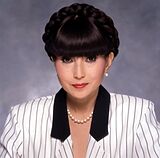
In Japan, panel shows where a group of celebrities talk together are very common. A famous Japanese talk show is Tetsuko's Room (徹子の部屋, Tetsuko no Heya), hosted by Tetsuko Kuroyanagi. It has been on the air since 1976 and has won world records for its long run.
Japanese talk shows often mix conversation with funny activities, similar to variety shows. The panel of guests usually changes for each episode and is made up of comedians and other famous people.
South Korea and Taiwan
Talk shows in South Korea and Taiwan also use a panel of celebrities. Like in Japan, they focus on humor and entertainment more than on specific topics.
Brazil
In Brazil, the host Jô Soares became famous for his late-night talk show, which ran from 1988 to 2016. His show set the standard for the genre in the country.
China
Early talk shows in China in the late 1990s discussed social issues. One show, Speak Up, was taken off the air after an episode on a controversial topic. In 2012, a new American-style talk show called Tonight 80's Talk Show became popular with young people.
See also
 In Spanish: Programa de entrevistas para niños
In Spanish: Programa de entrevistas para niños
- Talk radio
 | Delilah Pierce |
 | Gordon Parks |
 | Augusta Savage |
 | Charles Ethan Porter |


